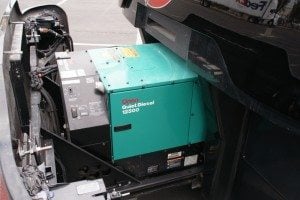 It’s no secret that your RV’s generator is one of the most important elements of creating a comfortable atmosphere in your motorhome. As the source of electricity for your lighting, appliances, and even safety, your generator should always be one of the top priorities on your RV maintenance list. But, what exactly should you be on the lookout for? Read on to discover a few tricks to ensure you get the most out of your generator, no matter what the occasion.
It’s no secret that your RV’s generator is one of the most important elements of creating a comfortable atmosphere in your motorhome. As the source of electricity for your lighting, appliances, and even safety, your generator should always be one of the top priorities on your RV maintenance list. But, what exactly should you be on the lookout for? Read on to discover a few tricks to ensure you get the most out of your generator, no matter what the occasion.
Why is consistent maintenance so important?
One of the biggest perks of owning an RV is the ability to travel nearly anywhere with modern-day luxury at your fingertips. However, this often lands avid motorhome travelers in scenarios where they may be miles away from a mechanic or repair services at any given time, making continual upkeep imperative for use. Each time you embark on a new adventure in your motorhome, you should be able to take peace of mind knowing every part of your vehicle is functioning optimally to avoid any untimely or unsafe happenings.
Start it up!
Luckily, the most important aspect of maintaining your RV’s generator is fairly easy, as one of the most common issues with generators comes with lack of use. When your generator sits stagnant for extended periods of time, the fuel will begin to decompose, creating a sticky residue that often causes hard starts or surging. Additionally, an infrequently-used generator may accumulate excessive moisture, which can cause added damage.
Even one month of idleness can mean major problems for your generator, and if your RV travel frequency doesn’t put you on the road that often, it’s important to make room in your RV maintenance schedule to gear up your machine and exercise the generator every three or four weeks to keep it in good shape. Once started, be sure to run it for about two hours with at least a 50 percent load on it, meaning either the air conditioner or heating units, depending on the temperature. Doing this will help take care of your generator so it’s road-ready whenever you are.
Check it out.
In addition to consistently running your generator to keep it healthy, you should also be aware of the component and the space around it. Before you turn it on, be sure to check for fuel or oil leaks, and ensure the oil level is safe. The air and fuel filters may also need special attention, so inspect them to make sure they’re functioning properly. Especially when traveling through dry or dusty areas, these filters can get full quite quickly, and may need to be cleaned or changed more often than normal.
Gas v. Diesel
When you purchase an RV equipped with its own generator, it’s supplied fuel from the same tank your motorhome’s engine uses. Although in general maintenance is very similar for the two, there are a few variances you should be aware of depending on your vehicle’s fuel type.
If your generator runs on diesel, understand that these models are specifically designed to run with a heavy load. Although the 50 percent load mentioned above is generally suitable for any generator, a diesel engine performs most efficiently at 70 to 80 percent output. In fact, when it functions below 40 percent for a prolonged period of time, it begins to over-fuel. In the case of a diesel generator, consider running the load slightly higher during exercise to ensure it’s running as effectively as possible.
On the other side, however, many of the idleness issues associated with generators are more common in gasoline models, so you may be able to wait slightly longer between start-ups if you own a diesel vehicle.
If you need help creating an RV maintenance schedule, Maintain My RV can help you create, track, and log your motorhome services online. Sign up today at www.maintainmyrv.com to ensure you’re always on top of your motorhome’s needs to get the most out of your RV experience.
